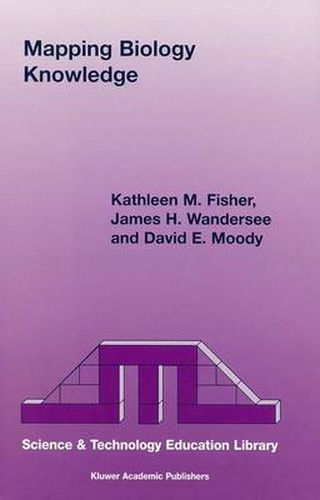Readings Newsletter
Become a Readings Member to make your shopping experience even easier.
Sign in or sign up for free!
You’re not far away from qualifying for FREE standard shipping within Australia
You’ve qualified for FREE standard shipping within Australia
The cart is loading…






This title is printed to order. This book may have been self-published. If so, we cannot guarantee the quality of the content. In the main most books will have gone through the editing process however some may not. We therefore suggest that you be aware of this before ordering this book. If in doubt check either the author or publisher’s details as we are unable to accept any returns unless they are faulty. Please contact us if you have any questions.
Mapping Biology Knowledge addresses two key topics in the context of biology, promoting meaningful learning and knowledge mapping as a strategy for achieving this goal. Meaning-making and meaning-building are examined from multiple perspectives throughout the book. In many biology courses, students become so mired in detail that they fail to grasp the big picture. Various strategies are proposed for helping instructors focus on the big picture, using the “need to know’ principle to decide the level of detail students must have in a given situation. The metacognitive tools described here serve as support systems for the mind, creating an arena in which learners can operate on ideas. They include concept maps, cluster maps, webs, semantic networks, and conceptual graphs. These tools, compared and contrasted in this book, are also useful for building and assessing students’ content and cognitive skills. The expanding role of computers in mapping biology knowledge is also explored.
$9.00 standard shipping within Australia
FREE standard shipping within Australia for orders over $100.00
Express & International shipping calculated at checkout
This title is printed to order. This book may have been self-published. If so, we cannot guarantee the quality of the content. In the main most books will have gone through the editing process however some may not. We therefore suggest that you be aware of this before ordering this book. If in doubt check either the author or publisher’s details as we are unable to accept any returns unless they are faulty. Please contact us if you have any questions.
Mapping Biology Knowledge addresses two key topics in the context of biology, promoting meaningful learning and knowledge mapping as a strategy for achieving this goal. Meaning-making and meaning-building are examined from multiple perspectives throughout the book. In many biology courses, students become so mired in detail that they fail to grasp the big picture. Various strategies are proposed for helping instructors focus on the big picture, using the “need to know’ principle to decide the level of detail students must have in a given situation. The metacognitive tools described here serve as support systems for the mind, creating an arena in which learners can operate on ideas. They include concept maps, cluster maps, webs, semantic networks, and conceptual graphs. These tools, compared and contrasted in this book, are also useful for building and assessing students’ content and cognitive skills. The expanding role of computers in mapping biology knowledge is also explored.